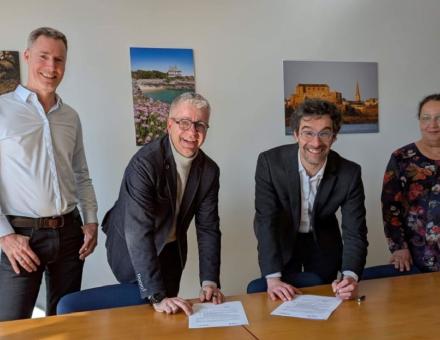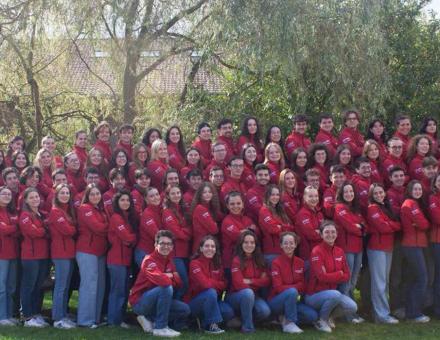Since 1987, the Erasmus (1987-2014) and Erasmus+ (since 2014) programs have facilitated the international mobility of learners and teachers in Europe and around the world. Based on reciprocal exchanges, it strengthens academic networks and also fosters innovation between participating higher education institutions.
Today, the European Erasmus+ exchange program is, along with the worldwide network of La Salle universities and bilateral partnerships, one of the pillars of UniLaSalle's international development.
Erasmus+ focuses on 3 main areas: student mobility, staff mobility and project development.
Student mobility
To encourage student exchanges between institutions, Erasmus+ has set up a system of grants to provide financial assistance for students to study or undertake an internship abroad.
Thanks to Erasmus+, 192 UniLaSalle students have benefited from a stay grant, and 135 from an internship grant in 2023-2024.
Philippine, a student in the Environmental Engineering program, went on an Erasmus+ trip to Wroclaw (Poland).
“Erasmus mobility was a real life experience that helped me evolve. I was able to discover incredible people with different cultures. Poland is a country I knew very little about, and I learned to appreciate it. Finally, the learning methods are different from those in France, as we have to do a lot of oral presentations, and I found this method very interesting and particularly effective. This Erasmus+ stay will remain a memory engraved in my mind for the rest of my life.”
Employee mobility
The Erasmus+ program also enables higher education staff to teach or receive training in a European institution. Here again, these exchanges are supported by grants to help finance transport and living expenses.
In 2023-2024, 15 UniLaSalle employees benefited from this scheme.
The projects
Erasmus+ also facilitates the deployment of cooperation projects between training, education and business players. UniLaSalle is particularly involved in 4 areas.
The best known is the Erasmus Mundus Masters of Excellence. Erasmus Mundus joint masters programs are prestigious international masters programs designed and run jointly by a group of higher education establishments. They involve at least 3 institutions from at least 3 different countries, as well as multiple academic and non-academic partners. They generally include periods of study, research, internship and thesis preparation and defense.
At UniLaSalle, the Erasmus Mundus Master in Plant Breeding (emPLANT+) brings together six European institutions - Hungarian University of Agriculture and Life Sciences (Hungary), Universitat Politècnica de València (Spain), Swedish University of Agricultural Sciences (Sweden), University of Natural Resources and Life Sciences (Austria) and University of Milano (Italy) - and Institut Polytechnique UniLaSalle in a training program of excellence in plant breeding.
The Erasmus+ program also encourages partnerships between European higher education establishments. UniLaSalle is currently involved in 5 such partnerships.
Finally, the program aims to improve students' knowledge of the European Union through the Jean Monnet module, a teaching program or short course corresponding to one of the following elements :
- general or introductory courses on European Union issues ;
- specialized teaching on European Union developments;
- or fully recognized summer and intensive courses.
Erasmus+ also funds International Credit Mobilities (ICM), which enable exchanges outside Europe.






